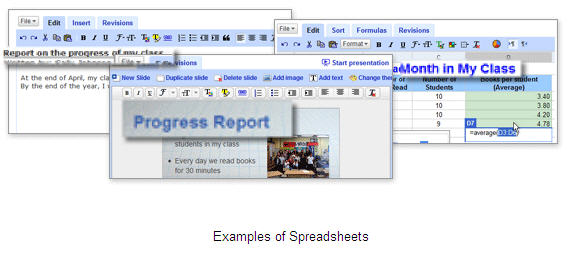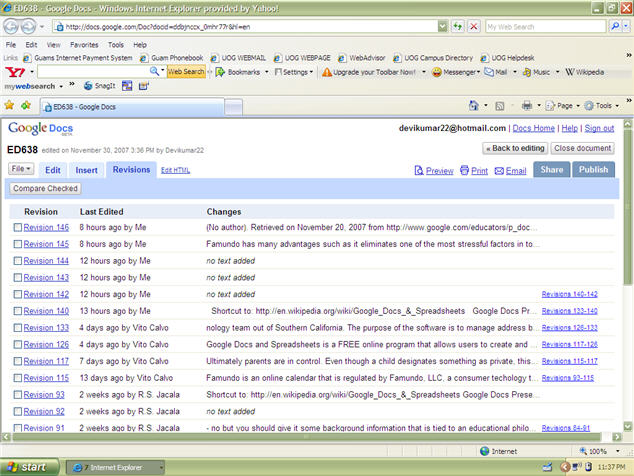Google Docs
Introduction
Uses in educational setting & Examples
Schools can use Google Docs for the purpose of bringing communication and collaboration tools to the entire academic community for free. Students, teachers and staff can share ideas more quickly and get things done more effectively when they have access to the same powerful communication and sharing tools. There's no hardware or software to install or maintain, since everything is delivered through a standard web browser -- anytime, from anyplace.
1. Spreadsheets
You can use spreadsheets to keep track of grades, attendance, student projects and assignments. You can maintain multiple spreadsheets, each for a specific purpose, and easily import data from other spreadsheets.
2. Presentation
Teachers can use presentations in Google Docs. You can create a presentation collaboratively and even co-present it online with live chat with your students. Students can easily of create group presentations and access them anywhere. The best part as well is that you could upload presentations on to your Google Docs. This allows teacher and students to communicate based on presentations.
3. Communication
Teachers can publish announcements about upcoming assignments and to monitor student progress. It is an interactive process which allows teachers to give guidance when it might be of maximum benefit – while your student is still working on an assignment.
4. Organization
Teachers will find that Google Docs can help Students learn to stay organized and keep on top of their assignments. It's easy to collaborate online with fellow students, even when they aren't in the same place. Teachers send feedback easily to students, parents, and enter updates anytime from anywhere. Students can go back to the revisions history to see how their assignment has evolved, and who has helped.
5. Documents
Students are able to do homeworks online and automatically send their assignments to their teachers that very day. The writing process can be taught and used by integrating the Google Docs document section in their teaching. It helps to promote group work and peer editing skills.
Pros and cons
In discussing the pros and con of central storage, A. Bylund 2006 concluded "It would rock to have a single point of storage for all my online profiles and activities." Storage is the strongest defense in support of Googledocs. To the classroom teacher whose work space may be at the school computer lab, the faculty lounge or the library, the online access to a web based storage is prime. In addition Googledocs is
- free; and
- familiar, having three programs for word processing, presentation and spreadsheet.
Other features include an automatic save of an active document every couple of minutes. Uploads of any external file of word, power point or spreadsheet document from a computer makes it possible to share with others online, or just have access to it from any computer. Simultaneous editing from different sites promotes collaborative work. Pictures or clip art may be inserted in the document file.
The ease of access in Googledocs is diminished by
- private data is automatically stored on the google server without user option for where data gets stored;
- formatting capability is limited. The presentation application does not offer many features like themes, templates, transitions, and animations;
- files cannot be accessed without the internet;
- users need to sign up as a Google user;
- Googledocs is not supported by the Safari browser;
- presentation slide show does not present as slide show in the Mac preview;
- published or shared files must first be accessed from email, ergo users must all have email accounts; and
- loading of file is slow.
References
Bylund, A. (2006). The pros and cons of central storage. Retrieved from http://arstechnica.com/news.ars/post/20061107-8168.html
No Author. Google Educator. Retrieved from http://www.google.com/educators/p_docs.html on November 20, 2007.



